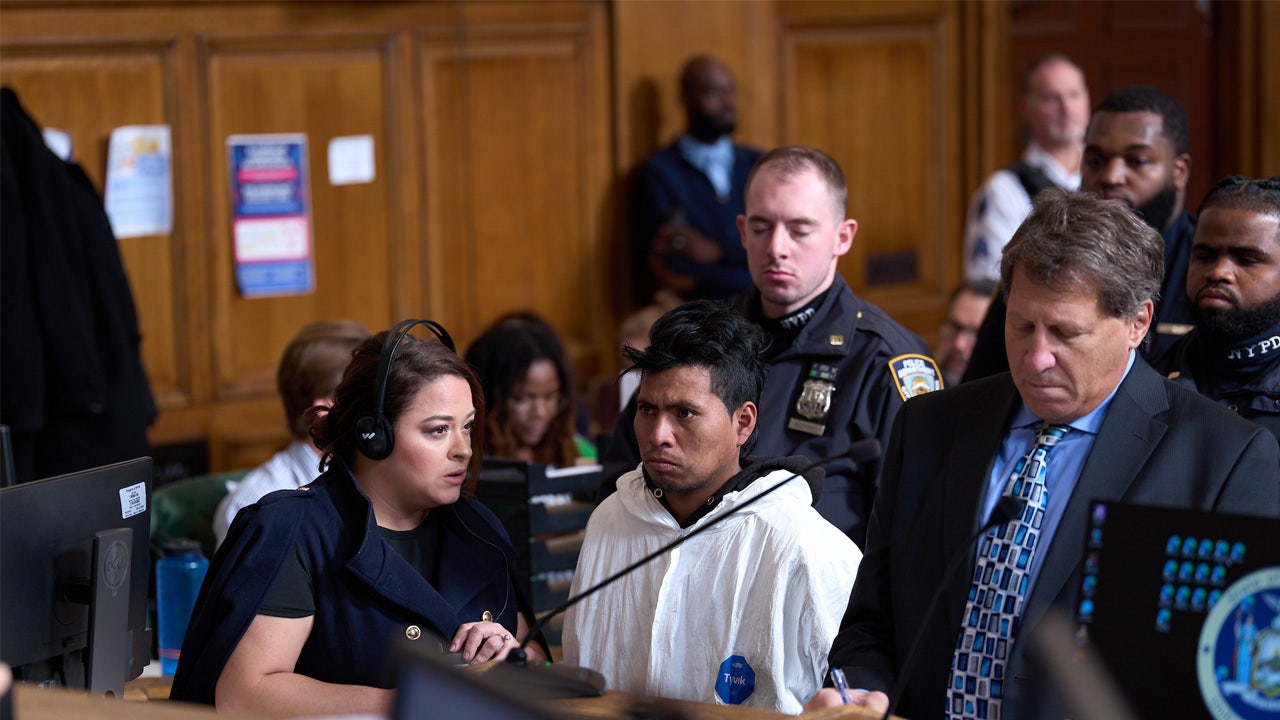Sergey Vasiliyk, leader of the rock band Tin Sonzya, performs for soldiers as part of the Cultural Forces unit for soldiers at the front line.Olga Gurenko/Cultural Forces
Several dozen Ukrainian soldiers are slowly gathering in the forest. They have recently returned from the front-line trenches. Many are exhausted, their uniforms dirty. Distant sounds of artillery can be heard, as one of the troops smokes silently, lost in thought. Just then a minibus arrives. Soldiers get off, pulling out guitars, other musical instruments and large boxes of equipment – an incongruous picture of musicians in a dangerous location.
This is just one of the many touring groups that make up the Cultural Forces of Ukraine, a troupe in the Armed Forces that includes in its ranks musicians, writers, actors and other artists serving in the army. Every month, they hold about 200 concerts along the entire 600-kilometre front line of the Russian-Ukrainian war. Usually, these are performances for small groups of soldiers, because it is too risky to put on large-scale concerts.
The idea started in April, 2022, shortly after the Russian invasion began. Famous Ukrainian TV star and musician Mykolay Serga joined the army in his native city of Odesa. The commanders of his unit soon realized he could be much more than a typical soldier, but rather someone who could support the mood and mental health of his comrades.
“The stress was palpable. We couldn’t sleep despite our exhaustion,” Serga said. “I decided to gather those who were off duty and read them poetry. Communication, poetry and sharing emotions worked. Our eyes sparkled, we laughed, we cried and we relieved the tension.”
From 2023: Ukrainians fear erasure of their culture as Russian bombs destroy heritage sites
That night was the first time when they managed to sleep, Serga said. So, he started doing this every day, whenever possible. And then, he began to get invitations from other military units.
Little by little, Serga’s initiative grew from two or three of his close friends to several dozen musicians, poets and artists. Most of them had joined the army with the sole goal of fighting the enemy. Serga convinced them that putting on concerts could also be useful.
For a long time before the war, Yuriy Ivaskevich was a solo vocalist with the Zaporizhzhya Regional Philharmonic. After the invasion, he joined the 110th Brigade of Zaporizhzhya Territorial Defence Forces. He took part in many battles and lost his left leg during the counteroffensive in 2023. After his rehabilitation, he joined the Cultural Forces.
Olha Rukavishnikova is a violin player who performed her first concert at the age of 5. Before the war, she was preparing to graduate from the Ukrainian National Tchaikovsky Academy of Music to become a symphony conductor. From the first days of the invasion, she started to serve as a gunner, then as a grenade launcher in the 112th Brigade. She took part in a counteroffensive in Kharkiv and survived five injuries, including losing an eye. Then she decided to join the Cultural Forces.
The Cultural Forces unit regularly visits the front line with concerts for soldiers to support the mental health and spirit of Ukrainian defenders.Cultural Forces
General Vladyslav Klochkov, who leads the General Directorate of Moral and Psychological Support of the Ukrainian army, recognizes the powerful role of art in the conflict.
“The guitar or the violin also could be a weapon,” he said. “The person who graduated from music school could be more useful as a musician in the army than as a soldier with a rifle, sitting at an observation point.”
Yevghen Voronetsky, the head of one of the touring groups of the Cultural Forces, said he was aware of a case in which a soldier had said that he wanted to kill himself, but changed his mind after seeing a performance and speaking with the artists. “Such stories give us the strength to work further,” Voronetsky said.
Putting on concerts is just one of the ways to support the morale of the fighters. In April, 2023, Serga came up with another way to help.
Not all of the one million Ukrainian soldiers sit in the trenches. Many serve on the second or third line of defence or are engaged in supply, repair or other non-combat roles. For them, the Cultural Forces delivers books – fantasy, history, fiction – in a project similar to ones carried out by the Allies in the Second World War. Ukrainian civilians buy the books and the soldiers of the Cultural Forces collect them and bring them to the front. More than 20,000 books have already been delivered this year.
As Ukrainian artists-turned-soldiers perish in war with Russia, a nation grieves its cultural losses
There are many poets and musicians in the army who are not part of the Cultural Forces. For these artists Serga, with the help of sponsors and patrons, has equipped a separate bus as a mobile music studio. They go around the front, recording songs with the troops. Over the summer, they recorded 14 songs. In the fall, they released five more. These are not necessarily songs about the war. One of the soldiers, for example, wrote a lullaby at the front for his little daughter, who lives in Estonia, far from the war.
In the fall, Serga took his initiatives abroad. He and several fellow soldier musicians put on 170 concerts in the U.S., which were billed as a “tour of gratitude to the American people.”
The Ukrainian musicians impressed members of the rock band Metallica so much that they published part of a Cultural Forces’ November concert in a Sacramento, Calif., church on their Instagram account. It features soldier Tara Stoliar playing Nothing Else Matters on the bandura, a traditional Ukrainian folk instrument.












